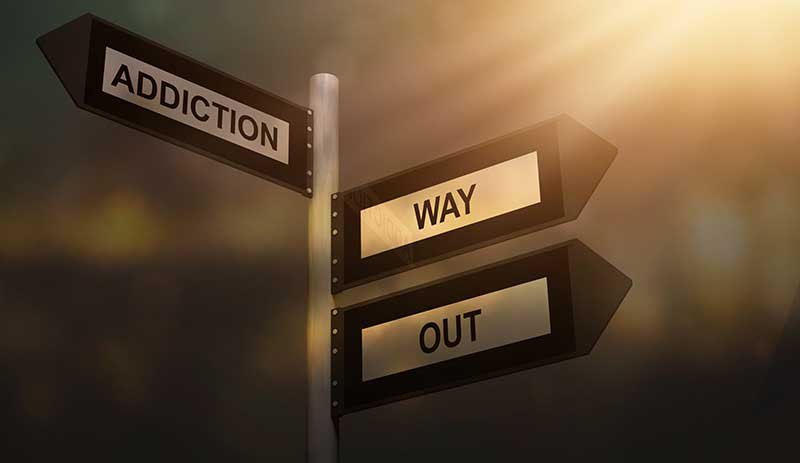Looking at addiction from the outside can leave many people confused. Why would someone continue with behaviors or substance use that is clearly destroying their life? The truth is that addiction is a complex substance use disorder that profoundly alters how a person thinks, feels, and behaves.
Addiction is as unique to each individual as fingerprints. However, understanding what addiction feels like from those who have experienced it can help us develop more empathy and provide better support to those struggling with substance abuse and mental health challenges.

The experience of addiction is so unique and personal to each individual suffering from it, that it is almost impossible to describe what being addicted to something feels like. This can also feel different depending on if a person is addicted to a substance, or to a behaviour, and can feel different again depending on what substance or behaviour.
Substances change how your brain functions over time. They release dopamine, a chemical in your brain that makes you feel good — until the substance wears off. Your brain and body want to continue this good feeling, even if it’s unhealthy. This neurochemical process helps explain why addiction can be so powerful, whether it involves alcohol, opioids, stimulants, or other substances.
People who have recovered from addiction often describe their experiences in powerful metaphors that help others understand the grip of substance use disorder. Here are some insights from those who have lived through it:
” It’s like being in a never-ending battle with yourself. You know what you’re doing is destroying your life, but you can’t stop. It’s like being a prisoner in your own mind.”
“Addiction is like trying to fill a void that can never be filled. You keep chasing something that’s always just out of reach, and it leaves you feeling empty inside.”
“Addiction feels like you’re drowning, and the substance is the only thing keeping you afloat. But in reality, it’s dragging you deeper into the abyss.”
“It’s a love-hate relationship with the very thing that’s ruining your life. You hate it for what it’s done to you, but you can’t let go.”
“Addiction is like a dark cloud that follows you everywhere. You can’t escape it, and it casts a shadow over everything you do.”
What emerges from these descriptions is a sense of powerlessness and internal conflict. The person with substance use disorder often recognizes the harm being caused but feels unable to break free from the cycle. This struggle is a defining characteristic of addiction as classified in the diagnostic and statistical manual of mental disorders.

Common symptoms of substance use disorder
According to the American psychiatric association’s diagnostic and statistical manual of mental disorders (DSM-5), substance use disorder is characterized by specific patterns of behavior. Understanding these symptoms can help identify when drug and alcohol use has become problematic:
Mental disorders can contribute to substance use and substance use disorders. Studies found that people with a mental disorder, such as anxiety, depression, or post-traumatic stress disorder (PTSD), may use drugs or alcohol as a form of self-medication. This creates a complex relationship where substance use and mental health issues can reinforce each other.
Environmental factors and family history also play significant roles in developing addiction. Genetic predisposition combined with early exposure to drugs and alcohol, trauma, or stress can increase vulnerability to substance use disorders.
Many people with substance use disorders also struggle with other mental health conditions. These co-occurring disorders (sometimes called dual diagnosis) require integrated treatment approaches that address both issues simultaneously rather than treating them separately.
Common co-occurring disorders include:
Not all addicts are aware that they have an addiction, or even that their use of the substance or behaviour is problematic. The awareness of addiction can vary from person to person, and changes over time for each individual.
Many individuals in addiction experience what’s referred to as ‘denial’. This is either a conscious or unconscious rejection of reality regarding their level of control and the impacts of the substance/behaviour on their life.
Denial is a powerful defense mechanism that can take many forms:
The journey to recognition often involves multiple stages, with many people not acknowledging their addiction until they’ve experienced significant consequences.
In psychology, the journey from complete denial into an acceptance and willingness to change can be described using the “Transtheoretical Model of Change”, or “The Cycle of Change”. Developed by Prochaska and DiClemente, this model can be used to understand someone’s ‘readiness’ to change when it comes to addiction.
Understanding this cycle helps both counselors and family members provide appropriate support based on where the person is in their recovery journey:
Recovery is rarely linear, and people often cycle through these stages multiple times before achieving stable recovery. This understanding helps reduce stigma around relapse and encourages continued support.
Effective treatment for addiction addresses the whole person—their physical health, mental health, social needs, and environmental factors. Treatment typically combines several approaches:
If you or someone you know is struggling with substance use, reaching out for help is a critical first step. Here are some guidelines:
Seek help if you notice:
Clinic Les Alpes is a leading provider of world-class addiction treatment and recovery services. If you think you, or someone you care about, are struggling with substance use or another addiction, we’re here to provide support.
Recovery from addiction is possible with the right support and treatment. The journey often includes:
Many people find that recovery brings unexpected gifts—greater self-awareness, deeper connections with others, and a renewed appreciation for life.
Every person’s experience of addiction is different, however one aspect that remains consistent is this feeling of inescapability, and dependence. For some, they may not be aware of this dynamic yet, and therefore be unprepare to change or challenge their addiction.
By learning what addiction feels like from those who have experienced it, we develop greater compassion and more effective ways to help. Substance use disorder is a complex condition influenced by biological, psychological, and social factors—not a moral failing or lack of willpower.
Whether you’re struggling with addiction yourself or supporting someone who is, remember that recovery is a journey, not a destination. With proper treatment, support, and patience, healing is possible.
If you or someone you know is struggling with substance use or addiction, don’t hesitate to reach out for professional help. The path to recovery begins with a single step.
For more information about addiction treatment options, contact Clinic Les Alpes today. Our expert team is ready to provide guidance and support on your journey to recovery.